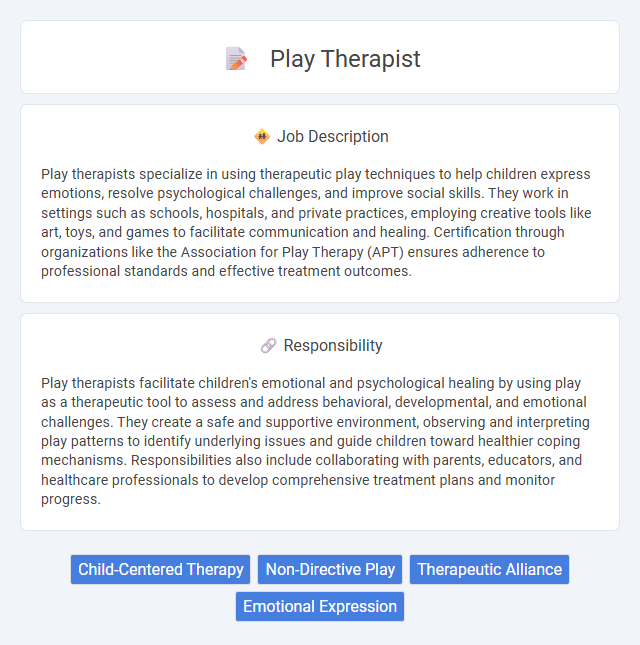
Play therapists specialize in using therapeutic play techniques to help children express emotions, resolve psychological challenges, and improve social skills. They work in settings such as schools, hospitals, and private practices, employing creative tools like art, toys, and games to facilitate communication and healing. Certification through organizations like the Association for Play Therapy (APT) ensures adherence to professional standards and effective treatment outcomes.
Play therapists are likely to be best suited for individuals who possess strong empathy, patience, and effective communication skills, as the role involves working with children and clients experiencing emotional or behavioral challenges. People who enjoy fostering creativity and have a genuine interest in psychological development may find this career particularly fulfilling. Those prone to high stress or difficulty managing emotional boundaries might find this job less suitable due to the intense nature of the client interactions.
Qualification
A play therapist typically requires a master's degree in counseling, psychology, social work, or a related field, along with specialized training in play therapy techniques accredited by organizations such as the Association for Play Therapy (APT). Certification as a Registered Play Therapist (RPT) often necessitates completing a specified number of supervised clinical hours and continuing education in child development and therapeutic play methods. Proficiency in understanding child psychology, developmental stages, and therapeutic interventions is essential for effective practice in this specialized counseling role.
Responsibility
Play therapists facilitate children's emotional and psychological healing by using play as a therapeutic tool to assess and address behavioral, developmental, and emotional challenges. They create a safe and supportive environment, observing and interpreting play patterns to identify underlying issues and guide children toward healthier coping mechanisms. Responsibilities also include collaborating with parents, educators, and healthcare professionals to develop comprehensive treatment plans and monitor progress.
Benefit
Play therapy likely offers significant benefits by supporting children's emotional and psychological development through creative expression. It probably helps in reducing anxiety and behavioral issues by providing a safe space for children to explore their feelings. This therapeutic approach may also enhance communication skills and promote problem-solving abilities in young clients.
Challenge
A play therapist likely faces the challenge of interpreting nonverbal cues and symbolic play to understand a child's emotions and experiences accurately. Managing diverse behavioral issues while building trust with young clients could require significant patience and adaptability. Navigating emotional complexities in therapy sessions may frequently test the therapist's skills and resilience.
Career Advancement
Play therapists develop specialized expertise in child psychology and therapeutic techniques, creating strong career advancement opportunities within mental health services. Pursuing certification through organizations like the Association for Play Therapy enhances professional credibility and opens pathways to leadership roles or private practice. Advanced skills in assessment and intervention increase eligibility for supervisory positions and collaborative multidisciplinary teams in healthcare settings.
Key Terms
Child-Centered Therapy
Play therapists specializing in Child-Centered Therapy create a safe, supportive environment where children express emotions through play, facilitating emotional growth and healing. They utilize techniques rooted in empathy and non-directive interaction to empower children, helping them process trauma, anxiety, and behavioral issues naturally. Expertise in developmental psychology and therapeutic play interventions ensures effective, individualized treatment plans promoting long-term emotional resilience in young clients.
Non-Directive Play
A Play Therapist specializing in Non-Directive Play facilitates a safe environment where children freely express emotions and thoughts through imaginative play. This therapeutic approach emphasizes child-led sessions, allowing natural exploration to promote emotional healing and self-discovery. Effective Non-Directive Play therapy supports developmental milestones by enhancing communication, problem-solving skills, and emotional regulation.
Therapeutic Alliance
A play therapist specializes in building a strong therapeutic alliance with children to facilitate emotional expression and healing through play. This bond fosters trust, enabling effective communication and the exploration of feelings in a safe, supportive environment. Establishing a secure therapeutic alliance is crucial for successful treatment outcomes in play therapy.
Emotional Expression
Play therapists specialize in facilitating emotional expression in children through structured play sessions that allow them to communicate feelings non-verbally. Utilizing techniques such as role-playing, drawing, and storytelling, these professionals help children process complex emotions and trauma in a safe environment. Mastery in child psychology and therapeutic interventions is essential for promoting emotional healing and behavioral development.
 kuljobs.com
kuljobs.com